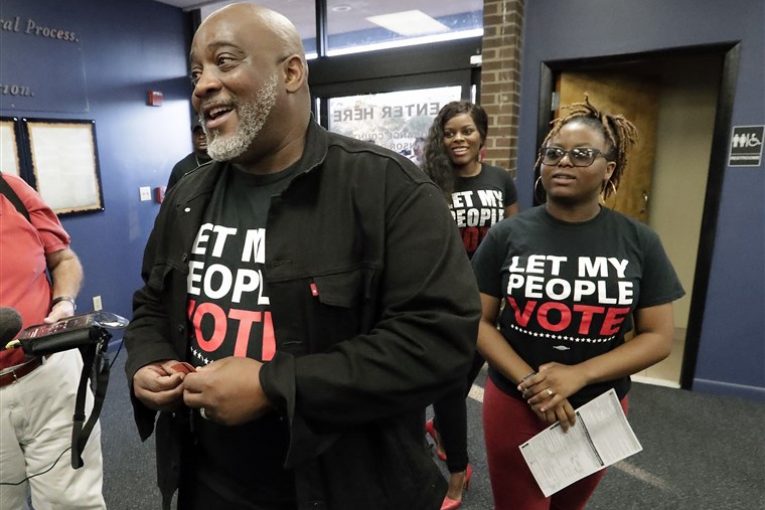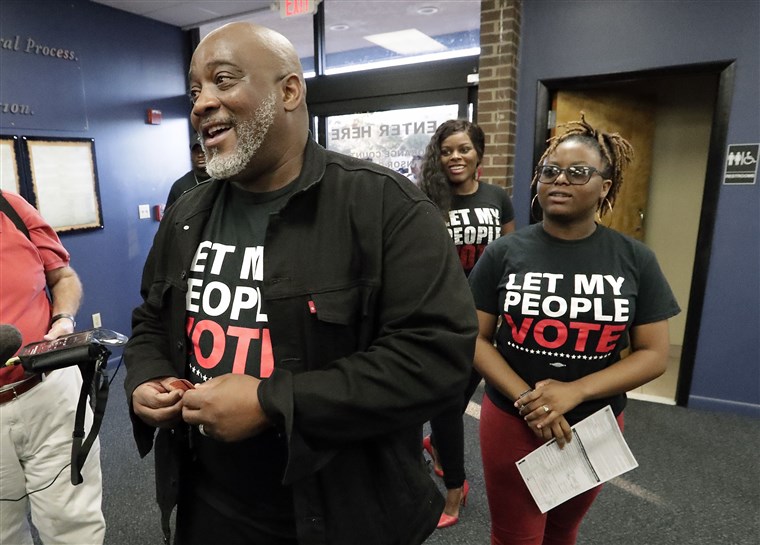

By Kelsea Valerio
WASHINGTON, DC – The Sentencing Project’s “Locked out 2020” report revealed Friday an estimated 5.2 million people – primarily people of color – will be prohibited from voting in the upcoming 2020 election in large part as a “legacy of slavery.”
The Sentencing Project is a national nonprofit that provides extensive research in order to address racial disparities and advocate for incarceration alternatives.
Sakira Cook, Justice Reform Program Director at The Leadership Conference for Civil and Human Rights said, “These felony disenfranchisement provisions are the legacy of slavery and were adopted after the civil war to undermine people of color’s political power.
“Together with the systemic racism of the Jim Crow era, that underlie the criminal legal system more broadly, felony disenfranchisement laws continue to perpetuate patterns of racial negligence. Ending these laws then is not only a democracy issue, but a social and racial justice issue.”
The Leadership Conference for Civil and Human Rights advocates for changes at the state and federal level in order to ensure that everyone, including those formerly incarcerated, has the opportunity to vote.
Those disenfranchised by current or previous felony convictions comprise 2.3 percent of the voting population. Presently, Florida has the largest proportion of disenfranchised individuals, with  more than 1.1 million banned from voting, usually because they are unable to pay court ordered money sanctions. according to the Sentencing Project.
more than 1.1 million banned from voting, usually because they are unable to pay court ordered money sanctions. according to the Sentencing Project.
The group noted that in Alabama, Florida, Kentucky, Mississippi, Tennessee, Virginia, and Wyoming, more than 1 in 7 Black Americans who are of voting age are disenfranchised because of a felony conviction. This is twice the national average. It has also been found that 1.2 million women are disenfranchised
Shakur Abdullah, now released after 41 years in prison and founder of Nebraska’s JustUS 15 Vote, believes that, “Voting is a prosocial behavior that really impacts recidivism. People feel as though they are a part of something.”
In the Sentencing Project’s previous report in 2016, it was found that there was an estimated 6.1 million disenfranchised people. This figure has declined in the last 4 years, as a result of states enacting policies to reduce this number.
In Cook’s closing statement she said, “No democracy can say that it is legitimate or can it survive when one group of people is disproportionately subjected to the power of police, and is consequently stripped of their voting rights.”
Key findings include the following:
- As of 2020, an estimated 5.17 million people are disenfranchised due to a felony conviction, a figure that has declined by almost 15 percent since 2016, as states enacted new policies to curtail this practice. There were an estimated 1.17 million people disenfranchised in 1976, 3.34 million in 1996, 5.85 million in 2010, and 6.11 million in 2016.
- One out of 44 adults – 2.27 percent of the total U.S. voting eligible population– is disenfranchised due to a current or previous felony conviction.
- Individuals who have completed their sentences in the eleven states that disenfranchise at least some people post-sentence make up most (43 percent) of the entire disenfranchised population, totaling 2.23 million people.
- Rates of disenfranchisement vary dramatically by state due to broad variations in voting prohibitions. In three states – Alabama, Mississippi, and Tennessee more than eight percent of the adult population, one of every thirteen people, is disenfranchised.
- Nearly 900,000 Floridians who have completed their sentences remain disenfranchised, despite a 2018 ballot referendum that promised to restore their voting rights. Florida thus remains the nation’s disenfranchisement leader in absolute numbers, with more than 1.1 million people currently banned from voting – often because they cannot afford to pay court-ordered monetary sanctions or because the state is not obligated to tell them the amount of their sanction.
- One in 16 African Americans of voting age is disenfranchised, a rate 3.7 times greater than that of non-African Americans. More than 6.2 percent of the adult African American population is disenfranchised compared to 1.7 percent of the non-African American population.
- African American disenfranchisement rates vary significantly by state. In seven states – Alabama, Florida, Kentucky, Mississippi, Tennessee, Virginia, and Wyoming – more than one in seven African Americans is disenfranchised, twice the national average for African Americans.
- Although data on ethnicity in correctional populations are still unevenly reported, a conservative estimate shows that more than 560,000 Latinx Americans or more than two percent of the voting eligible population are disenfranchised.
- Approximately 1.2 million women are disenfranchised, comprising more than one-fifth of the total disenfranchised population.
To sign up for our new newsletter – Everyday Injustice – https://tinyurl.com/yyultcf9
Support our work – to become a sustaining at $5 – $10- $25 per month hit the link:





